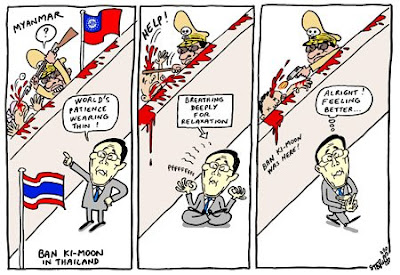

Ban Ki-moon, a general nonentity as secretary-general
For such a seemingly crucial position, the secretary-generalship of the United Nations has historically had a rather low bar for success. Kurt Waldheim? In his memoir, A Dangerous Place, Daniel Patrick Moynihan recounted that Waldheim functioned as "a post office, a somewhat antique but reasonably efficient public service run along Austro-Hungarian lines. As one sat down with him, he would be mentally sorting the mail while making small conversation." Boutros Boutros-Ghali? His arrogance and fecklessness as the Serbs laid waste to Bosnia prompted the Clinton administration to veto a second term. Kofi Annan? Brought low by his son Kojo's financial peculation in the Iraq oil-for-food scandal.
Even in this unimpressive company, though, Ban Ki-moon appears to have set the standard for failure. It's not that Ban has committed any particularly egregious mistakes in his 2½ years on the job. But at a time when global leadership is urgently needed, when climate change and international terrorism and the biggest financial crisis in 60 years might seem to require some—any!—response, the former South Korean foreign minister has instead been trotting the globe collecting honorary degrees, issuing utterly forgettable statements, and generally frittering away any influence he might command. He has become a kind of accidental tourist, a dilettante on the international stage.
Not for him bold speeches or attempts to mobilize public opinion behind what could be an organization that helps tackle nuclear proliferation or reconstruct Afghanistan. Not for him championing human rights, or even rallying in defense of beleaguered civilians. Visiting Malta in April for yet another honorary degree, he was evasive when asked about the island's penchant for sending illegal African immigrants packing off to Italy, saying, "I am not in a position to intervene." As tens of thousands of Tamil refugees lingered under fire on a narrow strip of beach in Sri Lanka, Ban and his advisors did little more than huddle in New York and wring their hands, only making a trip to the war zone after hostilities ended. Under his stewardship, the United Nations isn't merely an unhelpful place—it's a largely irrelevant one.
Ban's flaws were obvious dating back to his decades toiling in the South Korean foreign ministry, where he earned a telling nickname, "The Bureaucrat." Luckily for Ban, if not for the rest of the world, The Bureaucrat was exactly what the Bush administration was looking for after years of tussling with the assertively anti-American Annan. When it became Asia's turn to nominate a secretary-general, Bush's secretary of state, Condoleezza Rice, made Ban's election her pet project. But Ban failed to charm outside observers. In his book The Best Intentions, James Traub recounts a speech at the Council on Foreign Relations during Ban's campaign to become secretary: "[B]etween his anodyne oratory, and his unsteady grasp of English, I found that I had been lulled to sleep."
As secretary-general, Ban's soporific effect has never left him. One U.N. watcher told me that Ban is like the proverbial tree falling in the forest with no one around to witness its crash—if you don't hear him, does he really exist? Aside from his role as a subsidiary of South Korea, Inc.—lining his office walls with Samsung televisions and hiring his South Korean buddies as senior advisors—his imprint has been negligible. Even Ban seems aware of what a nonentity he is: Last August, speaking to senior U.N. officials in Turin, he described his management style as elevating teamwork over intellectual attainment. But he went on to bemoan his difficulty overcoming bureaucratic inertia, ending with a gnomic admission of general defeat: "I tried to lead by example. Nobody followed."
At their best, U.N. secretaries-general can serve as a goad to the world's conscience and a genuine catalyst for change. Dag Hammarskjold, for example, sought to expand the United Nations' mandate by undertaking high-profile and frequently risky missions, from meeting with Chinese leaders under Mao to securing freedom for 15 American pilots captured during the Korean War to traveling several times to the Congo in hopes of averting warfare during decolonization. During the 1980s, the urbane Javier Pérez de Cuéllar earned high marks for conducting talks between Argentina and Britain after the Falklands War and for bringing about Namibian independence from South Africa.
So far, Ban has no such successes to his credit. It's not as if there aren't enough crises around the globe for him to make his mark, whether in Sri Lanka or Sudan or the Middle East. But Ban hasn't given any indication that he's going to have an impact in any of these places—or even that he wants to.




 COMMENTS (1)
COMMENTS (1)


























